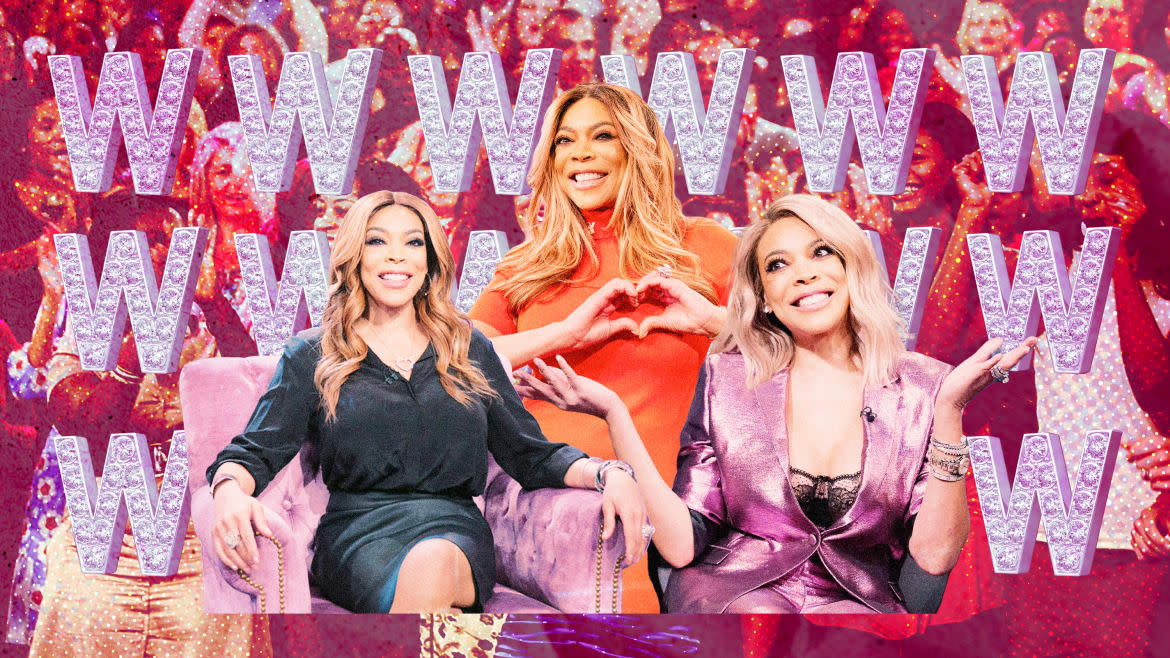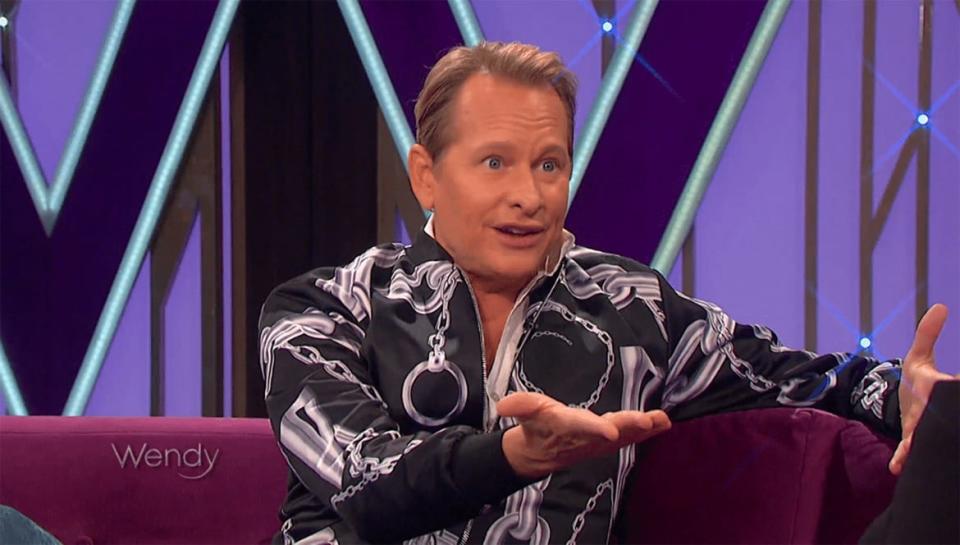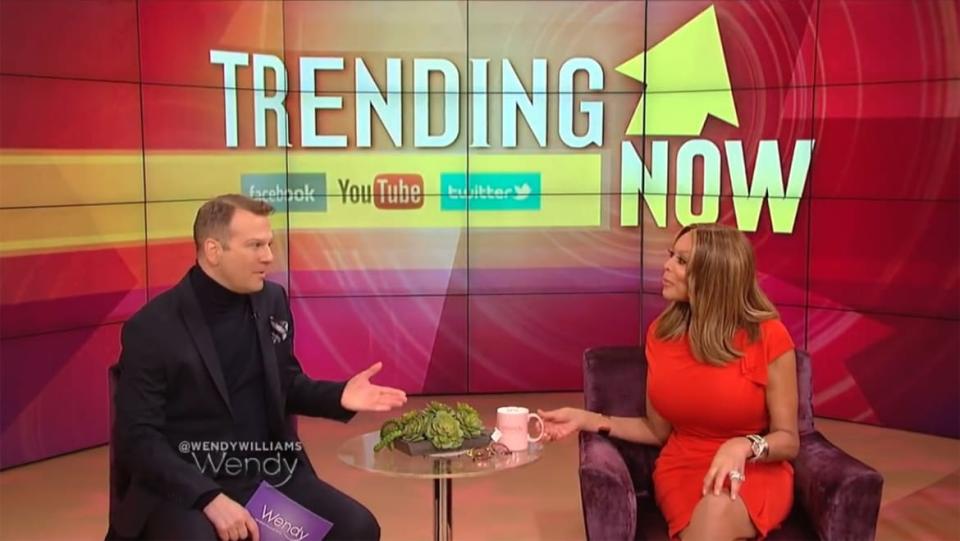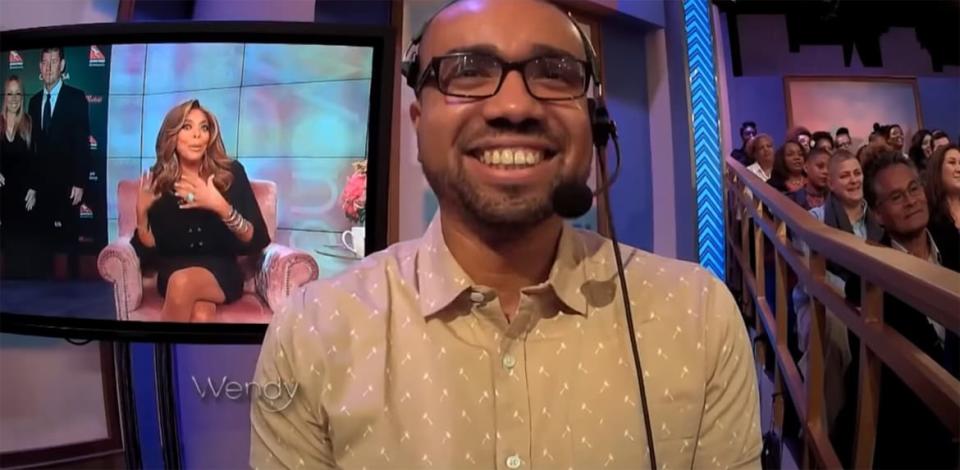The Messy and Fabulous Legacy of ‘The Wendy Williams Show’

- Oops!Something went wrong.Please try again later.
After 14 years, 2797 “How You Doin’s,” and innumerable memes and memories, The Wendy Williams Show has officially closed its sliding stage doors, marking the end of an era for a talk show that defined the word “iconic” before it became an overused pop culture descriptor for everything under the sun.
The last eight months of Wendy shows saw a slew of guest hosts filling in for the legendary talk show maven. A breakthrough case of COVID-19 and complications with her Graves Disease delayed the show’s thirteenth season weeks beyond its projected start date last fall, causing Williams to take time away from the show to focus on her health.
In February, it was announced that Sherri Shepherd, a frequent guest host in the months prior, would become a successor to Wendy with her own show, Sherri, debuting later this year for the 2022-2023 season. It was a move that upset fans, who were even more dismayed when it was officially announced this week that Wendy would air its last show today.
At the top of its final episode, Shepherd thanked the crew, guest hosts, viewers, and Wendy herself. “There is nobody like Wendy Williams,” Shepherd said. “From her days on the radio to ruling daytime talk for thirteen seasons, Wendy earned her title as the queen of all media.”
In its final moments, Wendy came to a close with a whimper in the form of a flimsy video montage dedicated to Williams and her show’s incredible legacy. No appearance, not even a pre-recorded message from the star of the show—the one who built its audience and carved out a new space in daytime for those who wanted a no-holds-barred host who wasn’t afraid to speak her mind and pick up the pieces afterward. Needless to say, Wendy Williams deserved better.
Have You Thanked God for Wendy Williams Today?
The Wendy show was a cosmic flash, a risky concept that could’ve completely bombed and been a forgotten blip in talk-show history. There are very few people who can hold up an hour-long daytime show on the premise of just being themselves, and Wendy Williams was one of the first of her kind. A Black woman spearheading a solo talk show with nothing more than a penchant for gossip and a built-in audience from a long-running radio show: It was never guaranteed that Wendy Williams ’particular brand would translate to the treacherous landscape of daytime television, where more traditionally "obvious" hosts, like Katie Couric, Anderson Cooper, and Meredith Viera all failed.
“I didn’t even think we were going to make it past our six-week sneak peek,” Williams told audiences in what would be her final sign-off last July. “Thank you for accepting us in the spirit in which this show has been done since we first started.”
From the jump, The Wendy Williams Show felt special. It was a show that was designed to feel like you were sitting in on a gossip session with your best friend, only amplified to the nth degree—the Wendy way. Audience participation was not only present but encouraged, often boosting Williams’ morale and making at-home viewers feel like they were in the studio themselves.

Carson Kressley on The Wendy Williams Show.
As both a repeat interview subject on the show’s purple couch and a frequent guest host in the last few months during Williams’ absence, Carson Kressley experienced Wendy’s welcoming nature firsthand.
“At one point, I was the most frequent guest on the show—I think 13 times, unless somebody has superseded me,” Kressley told The Daily Beast. “[Wendy] brought a whole new vibe to daytime television…the show is set up to create an environment where it’s festive and people feel safe and empowered to be exactly who they are. You feel relaxed and at home there.”
The environment of Wendy was so easy going that it felt much less produced than other similar shows.
Over the course of the show’s run, crew members didn’t just become characters on the show, but active participants in its segments. Co-Executive Producer Suzanne Bass and Supervising Producer Norman Baker are so beloved by fans for their rapport with Williams that they’ve both been the subjects of multiple-part compilation edits on YouTube highlighting their funniest moments on the show.
But it was the studio audience that gave the show a kind of vitality that you couldn’t find anywhere else in daytime. They were urged to cheer, laugh, shout, and be as opinionated as the host herself. “Wendy always called the audience her cohosts. You could easily brush that off as just an expression, but she really meant it,” longtime guest correspondent Brian Balthazar told The Daily Beast over Zoom. “The energy of the audience and the interactivity of the audience reflected that.”

Brian Balthazar and Wendy Williams
Videos chronicling Williams’ interactions with the audience have been viewed tens of thousands of times on YouTube. “I never realized I love Wendy so much until today,” one viewer commented. “This was so good, God it makes me fall in love with Wendy all over again,” said another.
Williams and her “cohosts” fed off each other’s boundless energy, creating some of the most laugh-out-loud moments that daytime TV has ever seen—often unintentionally. “The audience treated their role as cohosts seriously. They would yell and scream and cackle and interact as much as they could—it was part of the fun of the show,” Balthazar said.
But like any long-running talk show, Wendy was not without its (many, many) controversies. As Internet Meme Queen Supreme, Williams’ show was watched daily by hundreds of thousands of loyal viewers, many of whom were ready to jump anytime Williams misspoke.
Last summer, after Britney Spears called into a California court preceding regarding the status of her conservatorship, Williams publicly chided the Spears family. “Death, to all of them!” Williams said in a moment that was later edited out of the show’s online broadcast. Never mind that Williams had already spent years publicly throwing jabs at Spears’ mental health on her show.
Williams relished her role as a gossip-slinger and routinely came under fire for the opinions she’d throw out in her Hot Topics segments. She criticized Beyoncé’s intelligence level and Mariah Carey’s mental wellness. She made insensitive, cringey reports of people’s deaths and told gay men to stop wearing skirts and heels, and implied that men can’t menstruate—which she later tearfully apologized for. Those examples don't even begin to scrape the surface when it comes to controversies.
Yes, so much of what Williams said on her show was rude and inexcusable and completely out of touch. But Williams wasn’t bashful about her personality. She was outspoken and audacious. “Say it like you mean it” was literally the theme of her show.

Supervising Producer Norman Baker
She never changed herself to fit any mold or anyone else’s perception of who she should be—and she managed to carve a path for herself in a cutthroat industry by remaining authentic the entire time. People understood that and respected it—even those who found themselves in her crosshairs. There’s a reason that Mariah Carey wrote the lyric, “‘Cause they be all up in my business like a Wendy interview.”
That the show survived so many controversies speaks to how beloved it was. Even if you didn’t like what Wendy was saying, you couldn’t not watch her. Anytime Wendy would upset me with an off-color comment about queer people like myself or say something egregious and patently untrue about Mariah Carey or Beyoncé, I’d try to take a break. But I always found myself perched back in front of the television, waiting to see exactly what she was going to say next.
“You have Wendy, who’s sitting alone on that stage talking for 20 or 30 minutes, it’s very easy to underestimate how difficult that is,” Balthazar said. “And the fact that she was able to do that and have the audience is really something that I don't think we’ve ever seen before to that extent. The length of time that she was able to do it, I mean, a lot of talk show hosts do a monologue for five minutes. She did 30 minutes of straight talking.”
So often, Wendy would sit in her purple chair in front of a photo of some celebrity splayed across the screen behind her and spend an entire fifteen-minute stretch of a twenty-two-minute Hot Topics segment talking about a completely unrelated story about a meal she ate the day before or an event she was going to after the show. She was, and is, compulsively watchable without even trying. Wendy frequently referred to celebrities as “friends in her head,” which is exactly what Williams was to so many people every day for one whole hour. Her show was comforting and confounding, as fun to watch as it was irritating.
The last eight months without Wendy Williams in her purple chair have been tough. Just think about all of the hardships we’ve endured as a society since: one million hours of Stranger Things, a Jamie Lynn Spears memoir, a continued perpetual drought of Rihanna music.
Those things didn’t happen because of Wendy’s absence, but imagine how glorious it would’ve been to hear her comment on them, to rant and rave for five whole minutes about Beyoncé’s upcoming album before she trails off into a story about what she has waiting for lunch backstage.
The Wendy Williams Show was far from perfect, just like its host, who would be the first to admit that. Williams would refer to her show as “messy” and “stupid,” but its silliness was always its biggest asset. Wendy would not have been Wendy without the charm of its imperfections. To see the show end without her at the helm has proven extremely disheartening for many. But maybe that reign isn’t over..
“The biggest mistake anyone can make is to write off Wendy Williams and her ability to overcome challenges,” Brian Balthazar said when asked about what it was like to see Wendy ending without its star present. “So while everyone would love to see her round out the show with a big bang, I don’t think we’ve seen the last of her. And I look forward to seeing where she turns up next.”
Get the Daily Beast's biggest scoops and scandals delivered right to your inbox. Sign up now.
Stay informed and gain unlimited access to the Daily Beast's unmatched reporting. Subscribe now.

